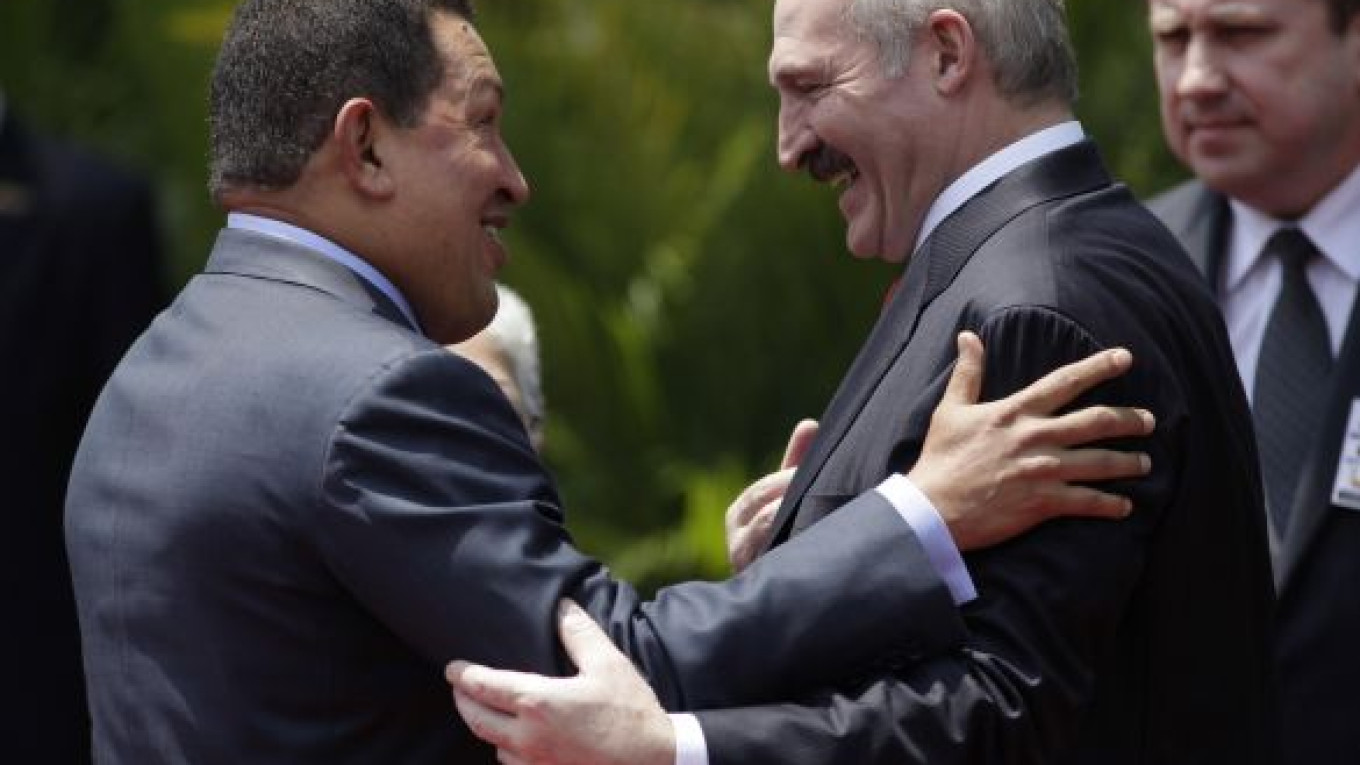A deal that could allow Belarus to reduce its Russian oil imports likely overshadowed Prime Minister Vladimir Putin's energy talks with the country Tuesday, possibly causing Russia to lose up to $1 billion in export duties a year.
The deal, reached between Belarussian President Alexander Lukashenko and his Venezuelan counterpart, Hugo Chavez, in Caracas on Monday, secures the delivery of up to 80,000 barrels of Venezuelan oil to Belarus every day, starting in May.
If the supplies materialize, a move that Russian experts said wouldn't make economic sense, they will cause Russian oil producers to annually reroute about 4 million tons of oil now scheduled to arrive at two Belarussian refineries. Belarus imported 21.5 million tons of oil from Russia last year, the maximum capacity of the two refineries, meaning that any Venezuelan imports would necessarily displace Russian oil.
At the current export duty of $253.6 per metric ton, Russia would collect about $1 billion per annum in budget revenues from outbound crude flows.
Lukashenko began his efforts to diversify oil imports after a spat with Russia over the New Year's holidays that revolved around lifting a discount on the oil export duty for supplies to Belarus. Russia managed to enforce a full duty — with the exception of supplies for Belarussian domestic consumption — despite being in a customs union with Belarus. The neighboring country's economy heavily depends on exports of refined Russian oil that used to be bought at a bargain. Lukashenko said Monday that Belarus and Venezuela would jointly refine the Venezuelan crude and market oil products.
Putin was scheduled to discuss energy trade with Belarussian Prime Minister Sergei Sidorsky at a session of a ministerial council in Brest near Belarus' western border. Talks were still ongoing Tuesday evening.
Russian oil companies would likely experience little trouble in marketing the 3.9 million tons that Belarus may replace with Venezuelan oil, said Svetlana Grizan, an analyst at VTB Capital. The amount represents about 1.5 percent of total Russian oil exports, she said.
The companies supplying crude to Belarus, however, such as TNK-BP and Gazprom-Neft, would not necessarily export the spare oil, she said. They may opt to refine it locally, depending on where they see higher profit, she said.
“I have no doubts about the possibility to sell this amount on other markets,” she said.
Alexei Kokin, an oil analyst at Metropol, said Venezuelan oil would be too expensive if it travels all the way to Belarus. Such a route would require the oil to be reloaded from tankers to railcars at one of the Baltic Sea ports, possibly in Lithuania. He speculated that the agreement was Lukashenko's show of defiance to Moscow in an attempt to renegotiate the export duty.
Before the talks in Belarus, Putin toured a border checkpoint, Kozlovichi-2, which will handle the customs union's commercial trucking starting in July. About 70 percent of the 4,000 trucks that cross the border eastward are bound for Russia, a Belarussian customs officer said.
A Message from The Moscow Times:
Dear readers,
We are facing unprecedented challenges. Russia's Prosecutor General's Office has designated The Moscow Times as an "undesirable" organization, criminalizing our work and putting our staff at risk of prosecution. This follows our earlier unjust labeling as a "foreign agent."
These actions are direct attempts to silence independent journalism in Russia. The authorities claim our work "discredits the decisions of the Russian leadership." We see things differently: we strive to provide accurate, unbiased reporting on Russia.
We, the journalists of The Moscow Times, refuse to be silenced. But to continue our work, we need your help.
Your support, no matter how small, makes a world of difference. If you can, please support us monthly starting from just $2. It's quick to set up, and every contribution makes a significant impact.
By supporting The Moscow Times, you're defending open, independent journalism in the face of repression. Thank you for standing with us.
Remind me later.


